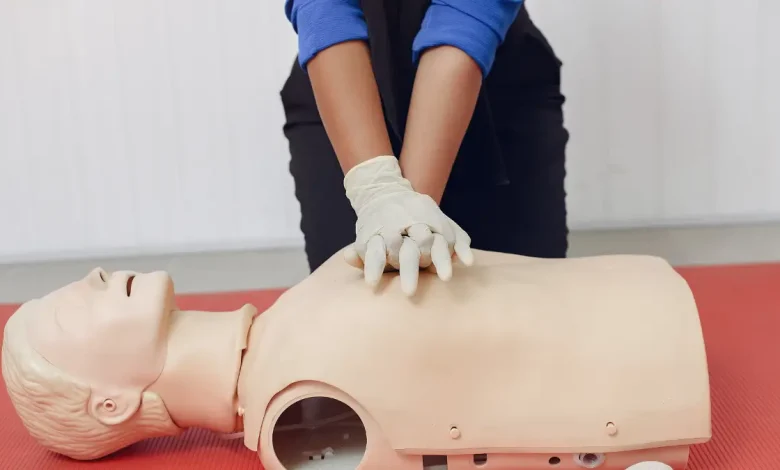How CPR and Trauma Training Are Building Safer Communities in Joburg

Seconds count in a crisis. A road accident on the Golden Highway, a heart attack at home, or a shooting in Soweto can all turn fatal if no one acts quickly. That urgency is driving new programmes across Johannesburg that train ordinary people — especially young women — in CPR and trauma care. These efforts are reshaping communities into safer, more resilient spaces.

READ MORE: Over 1,000 Patients Await Kidney Transplants in Gauteng Alone
Why Emergency Skills Matter
The World Health Organisation (WHO) estimates that prompt access to emergency care can reduce preventable death and disability by up to 50%. In Gauteng, where road accidents, violent attacks, and chronic illnesses often overwhelm emergency rooms, those figures translate directly into lives saved.
At the Advanced Airway Management Symposium on 20 August 2025, held at Sefako Makgatho Health Sciences University, MEC for Health and Wellness Nomantu Nkomo-Ralehoko reminded participants of what’s at stake.
“Airway management isn’t a technical skill; it’s the difference between saving and losing a life,” she said. “Every clinician who leaves here today more confident and better prepared takes us closer to a health system our people can trust in their darkest hour.”
Training Professionals — and Communities
The symposium gathered doctors, nurses, and paramedics from across the province. They practised how to open blocked airways, use advanced life-support equipment, and perform critical interventions during cardiac arrests, crashes, and trauma cases. Partners like Lebone College of Emergency Care and Dr George Mukhari Academic Hospital strengthened the training with expertise and resources.
But training hasn’t stopped with professionals. To mark Women’s Month, the GDoH launched the First Responder Training Programme in Devland, Johannesburg. Nearly 200 young women learned hands-on skills: performing CPR, treating burns, stabilising seizure victims, handling falls, and managing stab or gunshot wounds before ambulances arrive.
Empowering Young Women to Save Lives
Graduates say the training has transformed their confidence. Nontshindiso Ngcongo explained:
“I learned how to care for a sick person at home and respond to someone who has been burnt. Now I know what to do in an emergency until an ambulance arrives.”
Another participant, Thembi Khosa, said CPR training gave her new ambitions. “This programme opened my eyes. What I learned here made me consider a career in emergency care,” she said.
By training young women, the programme builds more than first-aid knowledge. It instils leadership, calm decision-making, and responsibility — qualities that ripple through families and communities.
“When women learn to lead and respond, they build stronger families and neighbourhoods,” MEC Nkomo-Ralehoko said at the graduation. “This programme is not just about first aid; it equips young women to save lives, lead, and inspire.”
Strengthening Gauteng’s EMS Capabilities
While community training grows, Gauteng’s Emergency Medical Services (EMS) is also modernising. The province has introduced ICU ambulances equipped with ventilators, suction machines, surgical kits, and advanced trauma gear. These mobile intensive care units allow paramedics to stabilise patients while transporting them to the hospital.
Every ambulance in Gauteng now meets — and often exceeds — national equipment standards. That means patients receive professional-quality care as soon as EMS teams arrive, closing the critical gap between first response and hospital treatment.
Why This Matters for Joburg Communities
Johannesburg carries a heavy burden of trauma: congested roads fuel collisions, violent crime endangers residents, and chronic illnesses often turn into emergencies. For township and informal settlement residents, waiting for professionals can feel endless. CPR and trauma training ensures someone nearby can step in until help arrives.
Civil society leaders say the programmes restore dignity as much as they save lives. “A neighbour who steps in during a crisis doesn’t just save a life — they strengthen trust and give communities confidence in their own resilience,” explained one health organiser.
A Broader Culture of Preparedness
The Devland First Responder Programme is already sparking calls for expansion. Activists in Soweto and Alexandra want training rolled out in schools, churches, and youth groups.
“When ordinary people know how to act, they change the story from waiting helplessly to taking charge,” said a community health organiser. “It builds a culture where everyone feels capable of making a difference in a crisis.”
Building a Safer Future
By combining professional training with grassroots empowerment, Gauteng Health is building a stronger emergency care system. Investments in ICU ambulances, advanced equipment, and the training of nearly 200 young women all move toward one goal: a province where no one dies simply because help arrived too late.
MEC Nkomo-Ralehoko summed it up best:
“Every clinician, every paramedic, every young woman who completes our training more prepared is one more lifeline for a Gauteng family.”
Final Word
CPR and trauma training are reshaping Johannesburg from the ground up. These initiatives do more than improve survival rates; they give communities the confidence and skills to face emergencies head-on. For Gauteng residents, the message is clear: healthcare reform is not only about hospitals and policies — it’s about enabling ordinary people to act when it matters most.
In a city where danger can strike without warning, knowing that neighbours, youth, and professionals are ready to step up might be the greatest safety net of all.
